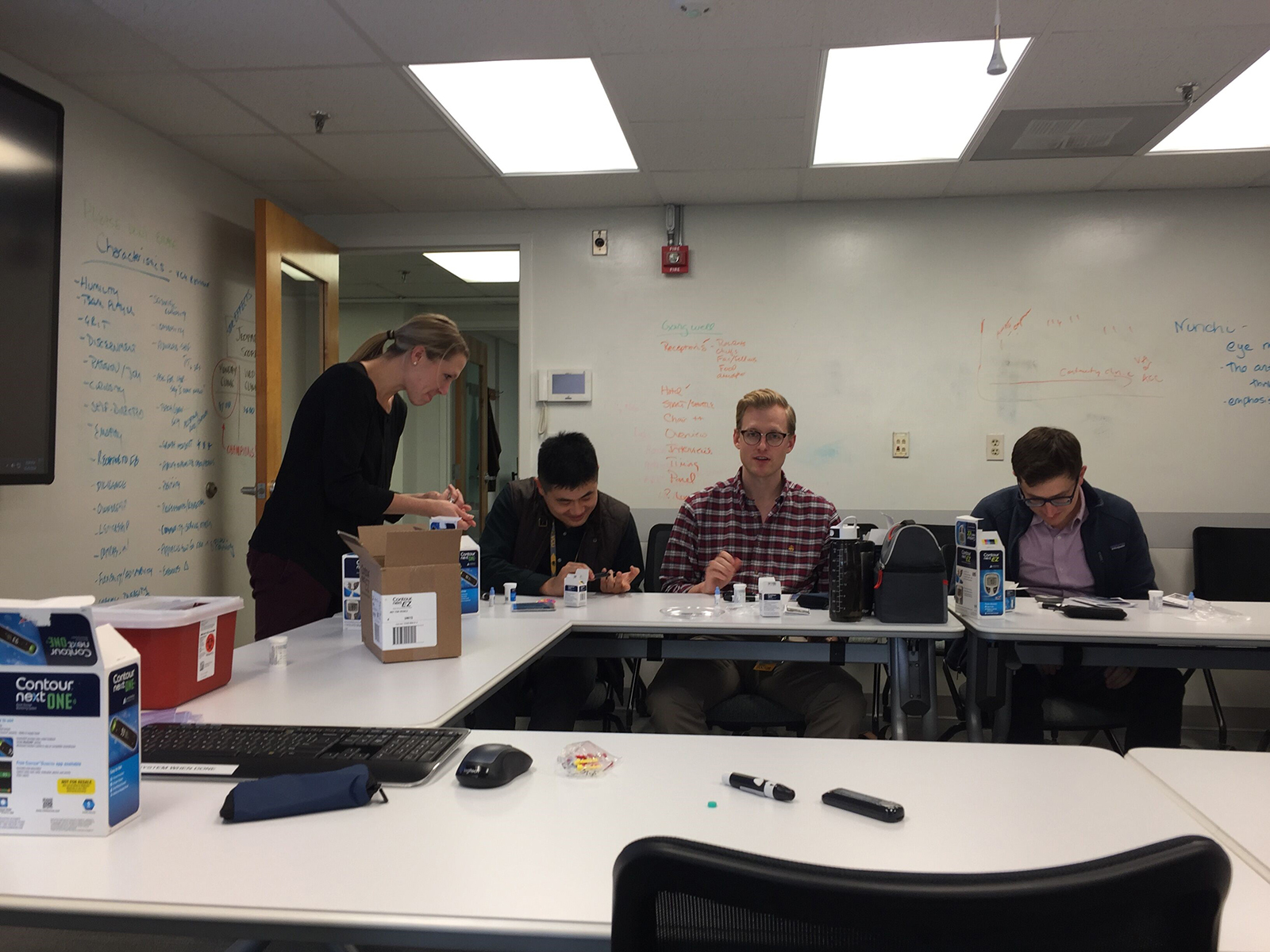VCU Diabetes Immersion Project: Appreciating the patient perspective
 More than 15 years ago, John Clore, M.D., then a professor in the VCU Department of Internal Medicine, created a curriculum to promote physician understanding of what patients experience while living with a chronic disease such as diabetes. This active learning curriculum, referred to as the Diabetes Immersion Project, has continued to evolve under the leadership of current program faculty and become a key educational initiative of the VCU Endocrinology, Diabetes and Metabolism Fellowship Program.
More than 15 years ago, John Clore, M.D., then a professor in the VCU Department of Internal Medicine, created a curriculum to promote physician understanding of what patients experience while living with a chronic disease such as diabetes. This active learning curriculum, referred to as the Diabetes Immersion Project, has continued to evolve under the leadership of current program faculty and become a key educational initiative of the VCU Endocrinology, Diabetes and Metabolism Fellowship Program.
Fellows participate in the multi-day diabetes immersion experience in both their first and second year of training. As part of the project, fellows first hear from patients about their journeys and lives with diabetes. During the interview, the patients are encouraged to share the positive and negative aspects of their life experiences with diabetes, including where they find support, the challenges they face in reaching their goals and what they want from a provider and the health care team.
This initial session is followed by four hours of detailed, hands-on instruction on diabetes self-management. In these sessions, lead by certified diabetes educators, fellows learn skills such as carbohydrate counting, insulin storage and administration, glucometer and continuous glucose sensor use, and treatment of hypoglycemia that patients need to effectively manage their diabetes.
Fellows then have the opportunity to spend the next three days living as if they have diabetes. The simulation-based component was included based on evidence that this active engagement might be more effective in learning self-management skills and in fostering the development of provider empathy for patients with diabetes. During this part of the diabetes immersion experience, fellows regularly monitor their glucose levels using a glucometer or sensor, administer “insulin” (i.e., saline) either by multiple daily injections or an insulin pump device, closely monitor their carbohydrate intake to estimate “insulin” requirement and respond to texts throughout the three days. A text might inform them that they are experiencing hypoglycemia, indicating that they need to interrupt what they are doing and manage the event; another text might indicate that they are experiencing hyperglycemia and need to replace their insulin pump infusion set.
The last component of the experience is a reflective activity in which fellows consider how the experience has impacted their perspective on their patients with diabetes.
The innovative program, which is highly valued by both learners and educators in the fellowship, enhances both the fellows’ abilities to educate patients on diabetes self-management skills and fosters provider empathy, says Fellowship Director Edmond “Trey” Wickham, M.D.
“As providers, we can often recommend numerous intensive changes for patients without truly recognizing the impact of what we are asking them to do,” he says. “This program helps us to appreciate why, for some patients, these changes can be especially challenging. Like all of us, patients with diabetes are balancing a lot of different priorities.”
Based on her positive experience with the program as a fellow, Morgan Vargo, M.D., a former chief resident, designed and initiated a resident-level diabetes immersion program for the VCU internal medicine residents in 2019. Since that time, all residents participate in a variation of the curriculum during their second year of training.
The residency curriculum is a modification of the original fellow curriculum but includes the three core aspects: 1) development of general diabetes self-management skills; 2) a volunteer immersion experience which includes carbohydrate counting, monitoring glucose using a glucometer and injecting saline to simulate insulin injections; and 3) a reflection component aimed at fostering empathy and reducing bias and stigma.
Endocrinology fellows and chief medical residents serve as the leaders of the resident diabetes immersion program, working with the residents over three different sessions.
Audrey Jernigan, M.D., who participated as a chief resident in the first year of the program, found it rewarding to watch residents discover what it was like to use diabetes supplies they had been prescribing in their primary care clinics.
“I remember one resident exclaiming, ‘I cannot believe I have been giving all my patients insulin syringes upon using an insulin pen for the first time,’” she says. “Residents constantly shared with me the simulation experience led to significant changes in their practice.”
After experiencing the program in his second year of residency, Reid Alley, M.D., discovered a renewed appreciation for all the hidden challenges a diabetes diagnosis brings to a patient’s lifestyle, from remembering to check blood sugar during a busy workday to eating at the appropriate times or remembering to eat, period.
“I now realize it is the patient, not the provider, who truly has the difficult job of managing this chronic disease,” he says.
Current fellow Sajal Patel, M.D., says that, after completing the program, many residents remark how it changes their approach to diabetes management with their own patients.
“Not only does the experience give them a glimpse of the complexity of living with a chronic illness,” she says, “it also gives them personal insight into aspects of management that allows them to actively help troubleshoot issues with the patient to help with overall disease management and improve outcomes.”